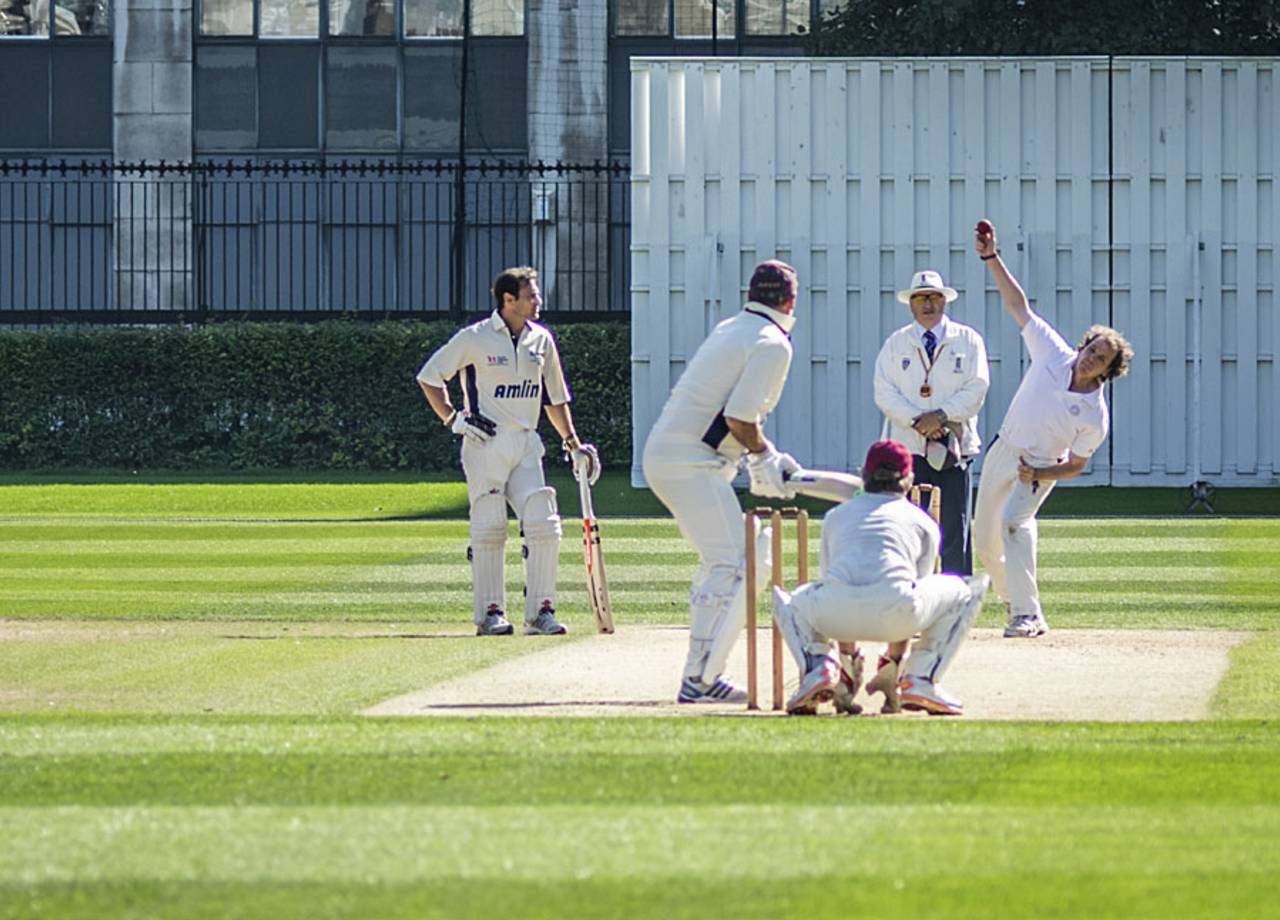Missing cricket? Don't stop playing
For several retired pros, life after cricket has meant more cricket. Permanently shutting out the game is harder than it looks
Nicholas Hogg
Sep 11, 2014, 5:37 AM

Last seen at: Mark Ramprakash (non-striker) bats during a charity match for The Sick Children's Trust • Massimo Petracca
The world of pro-am cricket comes with its own particular etiquettes. On Monday, in a match to raise money for the Sick Children's Trust, the Authors Cricket Club, the writers' team I vice-captain, took on a Mark Ramprakash XI featuring Min Patel, Alex Tudor, Steve Marsh and Matthew Hoggard. With several hundred punters sneaking off from work on a sunny afternoon to watch, a curious pressure built on the former pros to perform. Anything but fireworks from the superstars would be failure. In this same fixture last year, Ramprakash, who had been genial before the game, charming both the sponsors and the amateur opposition who were awed to be sharing the field with him, snicked one to first slip and was dropped - off my bowling, and yes, that's another story. Suddenly the chatty and joking celebrity was banished. It was the Mark Ramprakash of old, intense and focused, only speaking when he needed to swear - the batter who destroyed county attacks across the country.
This year the dark star wasn't needed. Beneath a cloudless sky he stroked a classy ton that had sponsors and spectators purring. It was what we all wanted to see. Even the suffering bowlers, watching Ramps fire red tracer bullets through the covers and scattering the beer tent, could admire the batsman who was taking them to pieces. True, we'd have an indelible anecdote if one of us bagged his wicket, but WG Grace defined the pro-am protocol long ago when he said, "They've come to see me bat, not you bowl."
And the crowd did see Ramps bat, until he retired on 120-something, finally bored by hitting boundaries off every delivery.
Unlike Sirs Botham and Boycott, who vowed never to pick up a blade in anger once they'd officially retired, Ramps still takes obvious glee in panning a cricket ball. When Shane Warne swore that he had finally parted with cricket - before the belated and doomed Big Bash League comeback - his kids apparently wept because they thought that was the end of their backyard games. They needn't have cried, and like other pros tempted back to the wicket, it seems Warne will never be far from swinging willow.
With the plethora of six-a-side tournaments, charity fund-raisers and city-financed games moneyed by cricket-loving CEOs, there is ample opportunity for the retired pro to keep playing - a post-retirement cricket circuit serving as a nursing home for the player not ready to return to civilian life.
Post Traumatic Stress Disorder (PTSD) is an anxiety syndrome caused by stressful and frightening experiences, and I wonder if this mental health issue needs redefining for retired cricketers, for those who suffer from PTJD - Post Traumatic Joy Disorder, a wistful and crippling nostalgia for a glorious past. One afternoon you're being hoisted aloft on the cheering crowd's shoulders and being carried off the ground; ten years later you're stood in a queue at the supermarket on a wet winter morning.

Matthew Hoggard hands out the gongs at the end of the game•Massimo Petracca
One treatment for this malaise is to never stop playing.
Iain O'Brien, the former New Zealand fast bowler and occasional Authors CC player (no, not a ringer, but a genuine author: see his wonderful children's book Pirates Don't Play Cricket) has furthered his rich career with competitive league cricket in Derbyshire. Considering that the former England offspinner John Emburey, aged 62, also still plays league cricket for Totteridge Millhillians, he could enjoy an extended post-county career in the trials and tribulations of hard-fought club matches.
For many ex-players, life after cricket simply means more cricket. The mometous Sachin Tendulkar retirement came with the grand statement of him quitting all forms of the game, only for him to lead out the MCC side in the Bicentenary Celebration match at Lord's less than a year later.
There is of course the coaching pasture for the retired pro to graze, but the pressures of competing without actually playing are not for all. It's a vicarious success you experience when the team you manage wins, not your century or your bowling spell that brought victory but the talent of the whippersnappers who will one day break that club record you set.
Perhaps the ultimate pension plan is commentating. Yet only the big names have seats in the TMS box or the Sky Sports studio, and friction between those still playing (e.g. Alastair Cook and Graeme Swann) and those being paid to give their opinion can fracture friendships. And being force-fed every ball of a dull game can be bitter medicine to a player living out his memories in a paralysed convalescence.
Some pros, however, find peace in the post-cricket world. I had a chance to talk with the happy-go-lucky Hoggard before the game on Monday - and at the crease, when he was chuckling away at first slip playing mind games - and asked, if like Andrew Flintoff, he'd been tempted into a T20 comeback. "Been there, done that. No interest." But what about the aspiring youngster, or the thwarted club man, that player who felt he could've been a pro but his face didn't fit, who might get hold of him and put him over the ropes? "I don't care if I get hit for six or take a wicket," shrugged Hoggard. "I love being out in the middle."
So did I, until Hoggard knocked my bails off and I walked back to the pavilion, looking over my shoulder to see his great big grin still beaming.
Nicholas Hogg is a co-founder of the Authors Cricket Club. His first novel, Show Me the Sky, was nominated for the IMPAC literary award. @nicholas_hogg